"Our village isn’t occupied, but people are still fleeing" – life in a Georgian village in the conflict zone before the elections
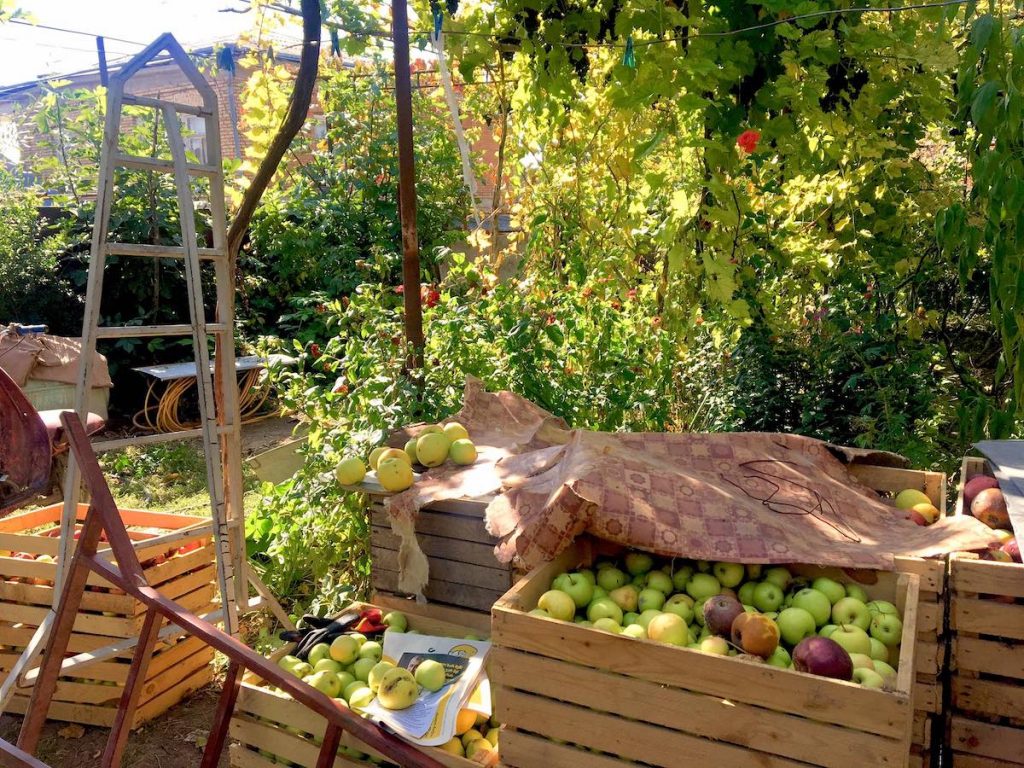
This year marks the twelfth autumn since the 2008 war and the eighth year since the Georgian Dream party came to power.
People living along the line of occupation discuss how their lives have changed over the years (for better or for worse), their expectations in 2012 and the real situation eight years later in a JAMnews report from the conflict zone.
_______________________________________________
Although this October turned out to be particularly warm, there are fewer people in the villages than is normal for this time of year.
The village of Ergneti is half empty. Most of the people who stayed are the elderly, and all of them are tending to their plots of land.
“Wait, wait, we can fit two more boxes.” The call can be heard from behind an open gate.
A bent-backed, 60-year-old man is carrying a box full of yellow apples from the yard and places it in the back of a small truck. Then he returns, almost dragging the second box.
“Take these away for now, then we’ll think about what to do with the rest,” he says to the driver, who starts the car and drives off, leaving behind a cloud of dust on the village road.
Almost all residents of Ergneti village, located on the line of occupation, have finished picking apples. Now their main concern is selling the harvest and stocking up on food for the winter. For many here, apples are the only source of income.
“It’s like pushing a boulder uphill, just to have it roll back down again. There was hail this year and half of the crop was lost. But if we sit down and start wailing, who will help us? What’s the point in that?!” says Niko Dvalishvili, a resident of Ergneti.
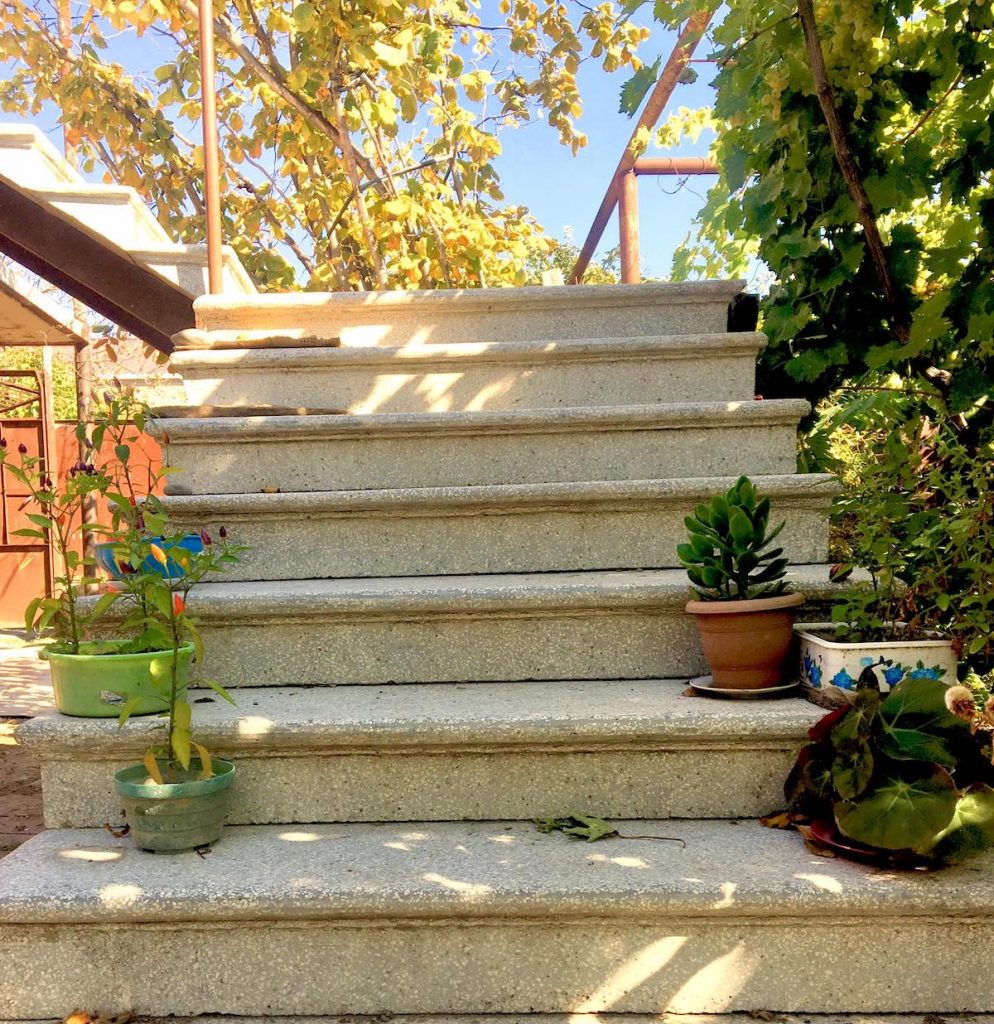
Like his fellow villagers, he handed over his hail-tainted fruit to a place in a nearby village where the government pays 22 tetri [about 6 cents] in subsidies per kilogram of sub-par apples.
“We’re in a position where every cent counts. There was a time when they paid 48 tetri [about 15 cents] for such apples, and we could buy much more food than we buy now”, says Niko.
Niko has a well-tended yard, in the shade of the alley there are boxes of apples, and by an outdoor sink there are large blue cans.
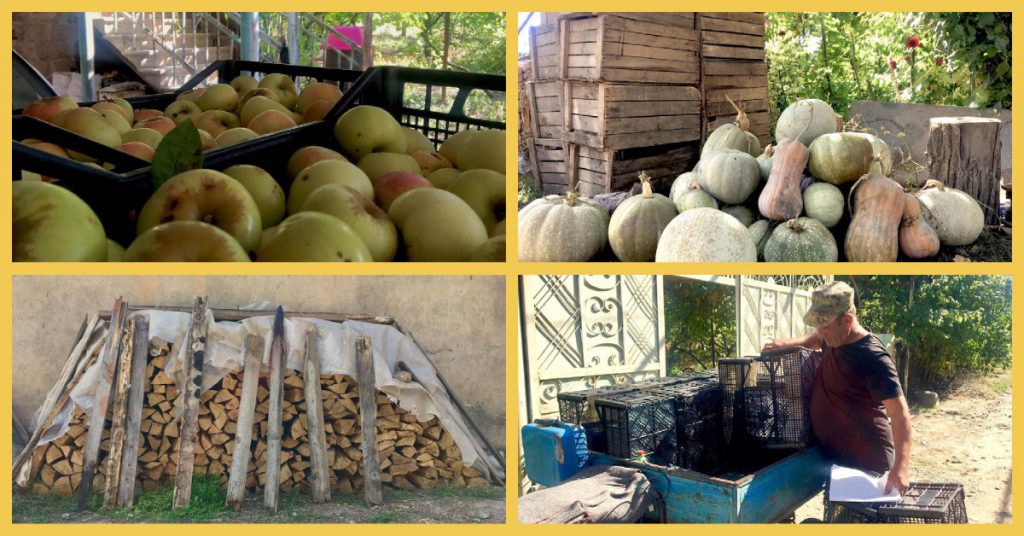
He says that water scarcity is a serious problem in rural areas in the conflict zone that has not been addressed for years.
“Our water runs every two days. We have been promised water all the time, but no one knows how soon it will be”, says Niko, picking the just yellowed leaves from the alley one by one.
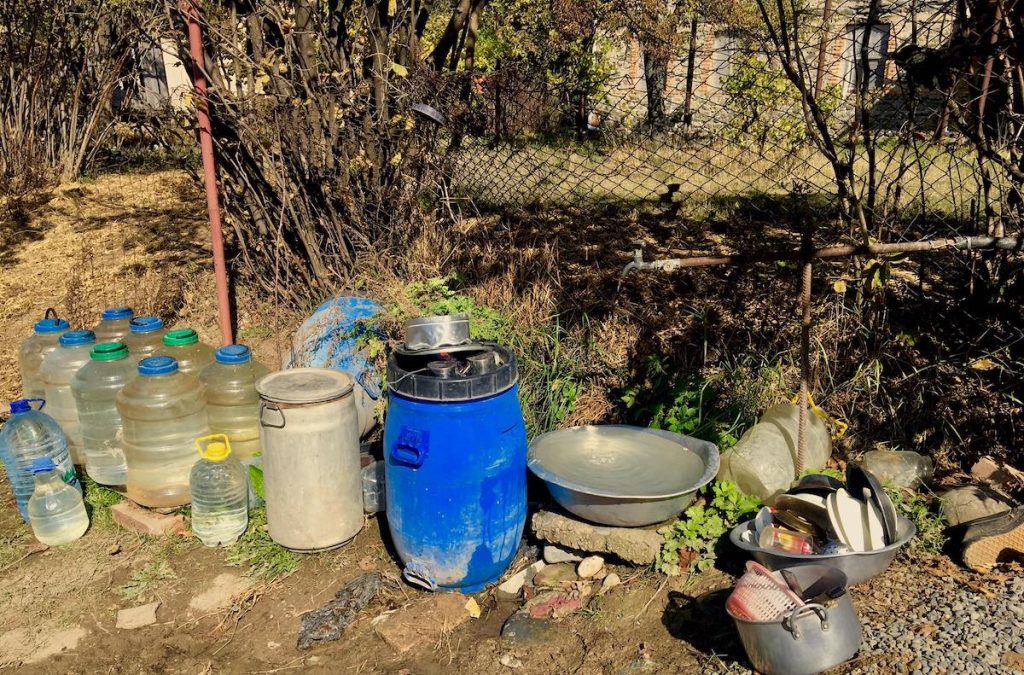
Ergneti is the last village in Georgian territory. When you reach the end of the village, a dividing line begins 200 meters away, followed by the city of Tskhinvali [the capital of South Ossetia – JAMnews]. It is five kilometers from Ergneti, and 30 kilometers from the city of Gori.
The further you are from Gori and the closer you are to the conflict zone, the less often you encounter the billboards with campaign posters that fill all of Georgia.
In Ergneti, bordering Tskhinvali, there are no such posters to be seen.
In Niko’s house, traces of the war are still visible.
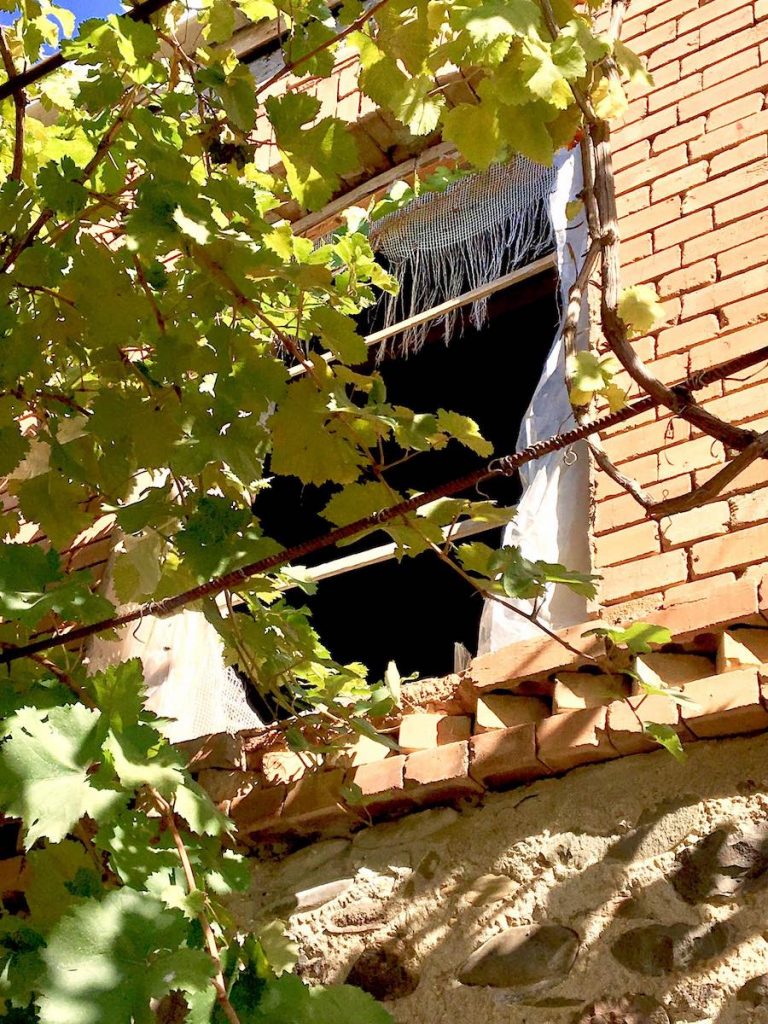
They do not discuss the elections here, some do not even know what candidates are running for the election on October 31.
Local residents say that politicians do not visit and did not give them any promises.
The election campaign is monitored only on television.
“It’s as if we don’t live in this country, we don’t count. I can’t even remember the last time a politician came. I think it was sometime in the spring”, says Niko.
Ergneti suffered the most during the 2008 war. Most of the houses here were burned down. Among them was Niko’s house.
On the second floor of Niko’s house, there are still traces of the war. Only the lower floor of the house was restored with the compensation received from the previous government to the tune of 15,000 lari [about $4,500].
“Everything burned down, I restored the first floor, the second one can’t be used anymore. I have given up hope that someone will do something to help me. The lower rooms are enough for me, living alone”, he says.
Almost all of Niko’s neighbors have left. Most of them chose not to rebuild their houses with the compensation they received, but instead left the village to start a new life in the city.
Currently, there are 240 registered residents of Ergneti. In 2014, there were 500.
“Before, I couldn’t tell the difference between the village and the city,” says Niko’s fellow villager Malkhaz Toroshelidze. But after the war, people kept leaving. They didn’t want to, but there is no other way out, there is no future here”.
The Toroshelidze family is celebrating their grandchildren coming to visit.
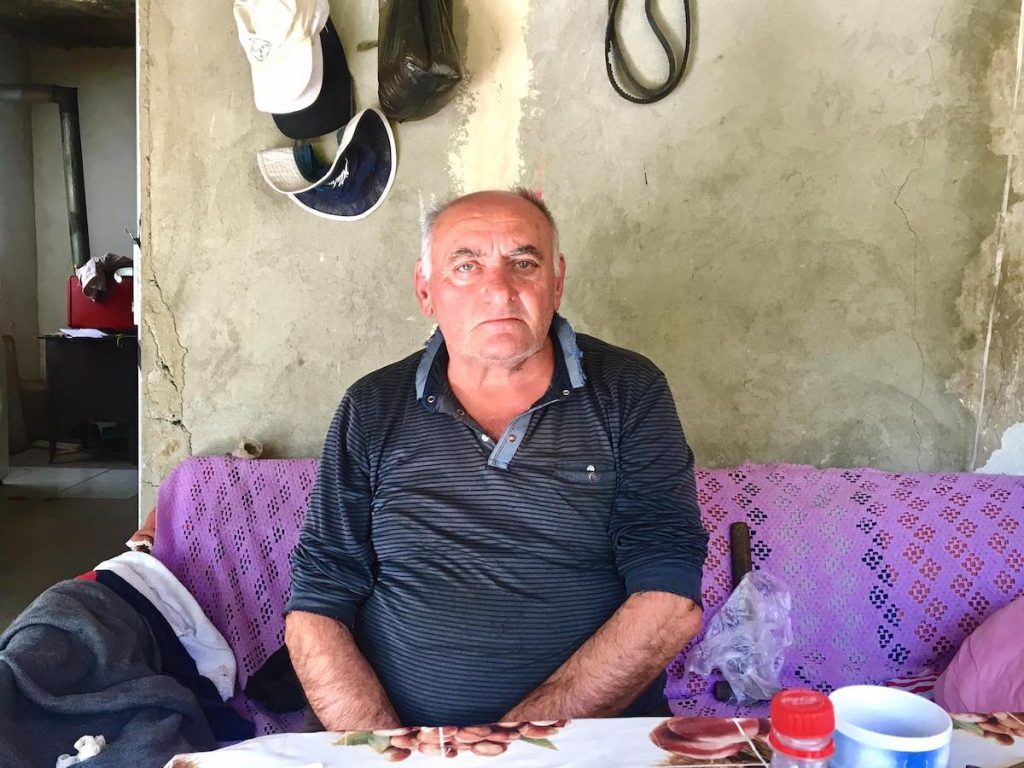
“Why did we leave the village? If we stayed, what kind of future would our children have? There is not even a kindergarten in the village. I love everything in this village, I do not want to lose anything, but love alone is not enough. We would have to work extra hard to stay here”, Madelena, Malkhaz’s daughter-in-law, told me.
“The Georgian Dream party came during the previous elections, they kept making promises that a kindergarten and a sports area would soon be built in Ergneti, but so far neither project has been started. The poverty in this village is the same as it ever was”, she said.
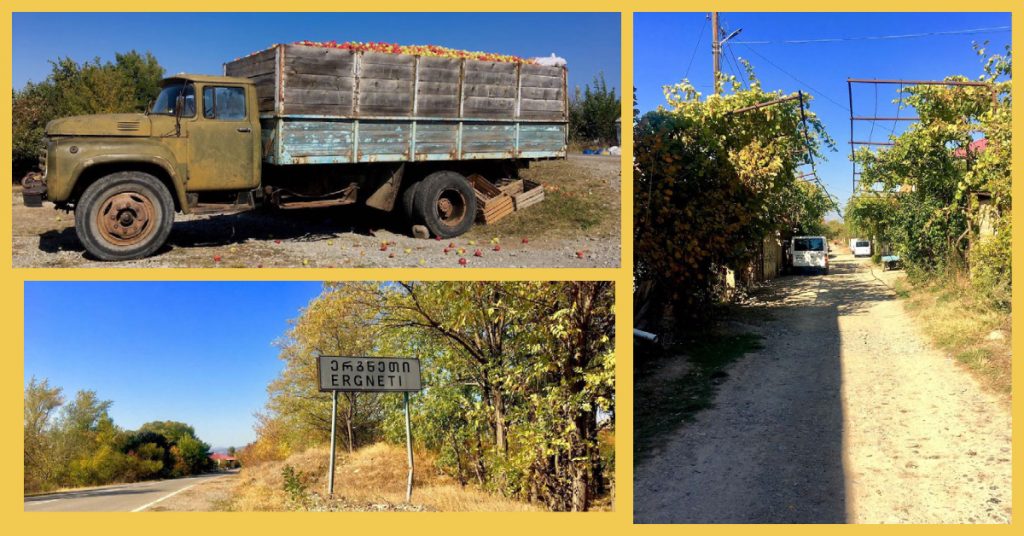
Malkhaz chimes in, adding:
“They say that if you work, you won’t die of hunger in the village, but if I can no longer work, what should I do? I have gangrene in my leg, how can I care for a garden or cattle? What else can a man do in the village?!”
Malkhaz is constantly in need of treatment and medicine. His son Levan says that they wanted to get a bank loan, but could not:
“We have a large garden, but we needed money to treat my father and no one gave us a loan. Banks avoid giving mortgages on land near the line of occupation. The second problem is land registration. We have eight plots in different places, I drew up schematics, and it cost me 400 GEL [about $123]. This is a lot of money”, says Levan.
Although the government promised free land registration to citizens living near the line of occupation, most local residents did not use this service because they have to pay to draw up the schematics, which they say they have no money for.
“Therefore, everyone who can leave will leave, and no one can criticize us for this. People are fleeing from territories, even though they are not occupied”, Levan says and immediately recalls the upcoming elections.
“Even during the elections, no one remembers our village. They hang their posters everywhere, but they don’t come here. Local residents learn from TV that there is an election in the country. Ask these people if they received specific promises from anyone”, he says.
Levan says he will not go to the polls because he does not believe anything will change:
“People who work or have working family members will go to the polling stations. These people are afraid of losing their jobs. And so, everyone has lost hope in politicians, no one else is waiting for help or support”.
Ergneti residents say they are surprised when they hear the ruling party’s election promise on television that “the peace must be preserved”.
They say that they do not have a sense of peace and security, so there is nothing to preserve.
“This cannot be called an excuse, but I don’t know how to put it another way—an iron fence has been installed along the line of occupation in Ergneti. Locals know how far they can go. But this is not known in other villages. Their cows graze in the pasture, and then we see that they are stolen and taken to Tskhinvali”, says Dzhemal Dolidjashvili.
He lives with his wife at the entrance to Ergneti.
From here, the road leads to the school, although no children’s voices are heard in this part of the village.
The school in Ergneti has about 50 students. Most of them live in Gori and are enrolled in the local school because the state finances higher education for its graduates—as well as for other applicants living near the occupied territories.
Local residents say that this is almost the only project being implemented by the state to encourage people to stay in this strategically important village.
“No one likes to watch villages being devastated. We love both the village and the country. But next year there will be no first graders in the village, because there are no more young families and children here”, says local resident Giorgi Kasradze.
He is one of the young people living in Ergneti and does not plan to leave in the future.
“I have the feeling that I am protecting my land by living here. If I go somewhere, the thought of this place will haunt me. I want to set up a business breeding cows and producing dairy products. I started to work, but the government did not provide me with pastures. But I will not stop, I need to come up with a way to see this project through to the end”.


















